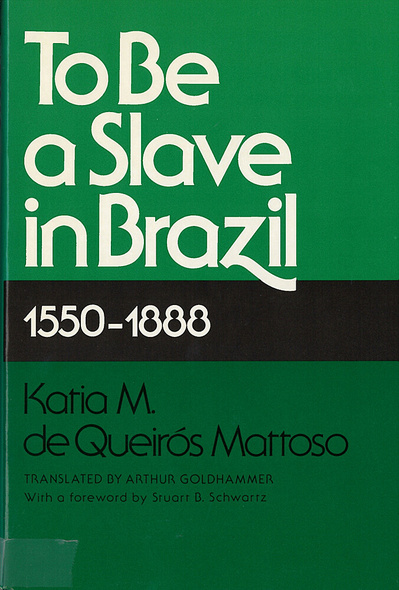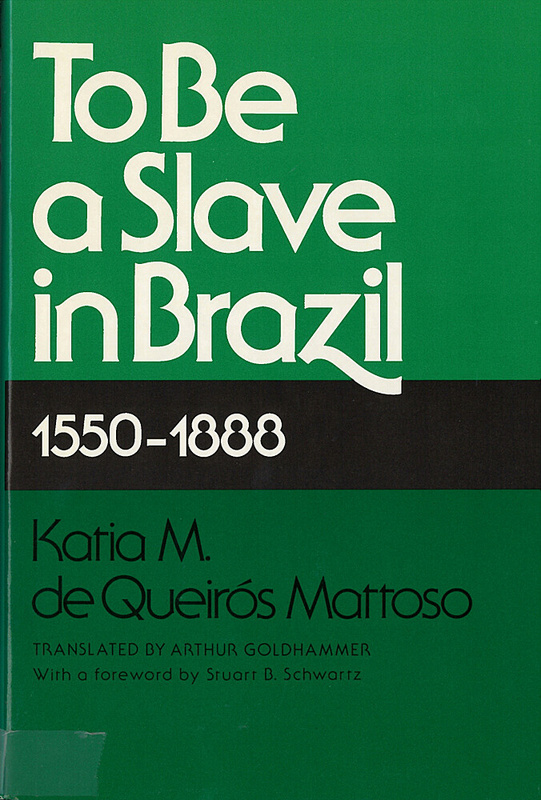This book was published originally in French in 1979 and in Portuguese in 1982. Written without scholarly footnotes for a general readership, it is a deceptively simple book direct in its presentation, lacking a specialized jargon, and organized in an imaginative and interesting way. But it also is a volume that reflects some of the most recent and innovative research on the question of slavery. Putting aside the somewhat arid debate over the feudal or capitalist nature of the "slave mode of production" and the political aspects of the movement for abolition, To Be a Slave in Brazil presents an overview of Brazilian slavery which reflects the trend toward study of the slave community, religion, the family, and other features of the internal aspects of slavery.
This book was published originally in French in 1979 and in Portuguese in 1982. Written without scholarly footnotes for a general readership, it is a deceptively simple book direct in its presentation, lacking a specialized jargon, and organized in an imaginative and interesting way. But it also is a volume that reflects some of the most recent and innovative research on the question of slavery. Putting aside the somewhat arid debate over the feudal or capitalist nature of the 'slave mode of production' and the political aspects of the movement for abolition, To Be a Slave in Brazil presents an overview of Brazilian slavery which reflects the trend toward study of the slave community, religion, the family, and other features of the internal aspects of slavery.
This book was published originally in French in 1979 and in Portuguese in 1982. Written without scholarly footnotes for a general readership, it is a deceptively simple book direct in its presentation, lacking a specialized jargon, and organized in an imaginative and interesting way. But it also is a volume that reflects some of the most recent and innovative research on the question of slavery. Putting aside the somewhat arid debate over the feudal or capitalist nature of the 'slave mode of production' and the political aspects of the movement for abolition, To Be a Slave in Brazil presents an overview of Brazilian slavery which reflects the trend toward study of the slave community, religion, the family, and other features of the internal aspects of slavery.
Katia Mytilineou de Queirós Mattoso (born Kyriacoula Katia Demetre Mytilineou ; Volos , 8 of April of 1931 - Paris , 11 of January of 2011 was a historian Greek-Brazilian, a specialist in Bahia's economic and social history (1750-1889) and in the social history of slavery in Brazil (1549-1888).
Katia Mattoso was a professor at the Catholic University of Salvador and Bahia Federal (1963-1988), visiting professor at the Universities of Minnesota (1978), Paris IV (1982) and Columbia (1983). He was also visiting fellow at the University of Cambridge ( UK ). In 1988, he took the chair of History of Brazil at the University Paris IV - Sorbonne, of which he was the first holder. Teacher emeritus of the same University, he is the author of several books, among which are: Bahia: the city of Salvador and its market in the nineteenth century (São Paulo: Hucitec, 1978), Être esclave au Brésil, XVIe-XIXe siècles (Paris : Hachette, 1979; Paris: L'Harmattan, 1995), with editions in Portuguese ( Being a slave in Brazil São Paulo: Brasiliense, 1982; 3.ed. 1990) and English (To Be a Slave in Brazil ,New Brunswick. , NJ: Rutgers University Press, 1986; 7.ed. 2002), Family and society in nineteenth-century Bahia (São Paulo: Corrupio, 1988) and Bahia, nineteenth century. A province in the Empire (Rio de Janeiro: Nova Fronteira, 1992, 2.ed. 1994).
Katia Mattoso was a professor at the Catholic University of Salvador and Bahia Federal (1963-1988), visiting professor at the Universities of Minnesota (1978), Paris IV (1982) and Columbia (1983). He was also visiting fellow at the University of Cambridge ( UK ). In 1988, he took the chair of History of Brazil at the University Paris IV - Sorbonne, of which he was the first holder. Teacher emeritus of the same University, he is the author of several books, among which are: Bahia: the city of Salvador and its market in the nineteenth century (São Paulo: Hucitec, 1978), Être esclave au Brésil, XVIe-XIXe siècles (Paris : Hachette, 1979; Paris: L'Harmattan, 1995), with editions in Portuguese ( Being a slave in Brazil São Paulo: Brasiliense, 1982; 3.ed. 1990) and English (To Be a Slave in Brazil ,New Brunswick. , NJ: Rutgers University Press, 1986; 7.ed. 2002), Family and society in nineteenth-century Bahia (São Paulo: Corrupio, 1988) and Bahia, nineteenth century. A province in the Empire (Rio de Janeiro: Nova Fronteira, 1992, 2.ed. 1994).
Foreword by Stuart Schwartz
Preface to the English Edition
Introduction
PART 1: TO BE SOLD INTO SLAVERY
1. To Be Sold into Slavery in Africa
2. In Brazil: Merchandise like Any Other
3. To Be Valuable Merchandise
PART 2: BEING A SLAVE
4. The African Adapts to Brazil and the Brazilians
5. Solidarities
6. Refuges and Refusals
PART 3: THE END OF SLAVERY?
7. The Charter of Freedom
8. The Mirage of Freedom
9. The Manumitted Slave as Social Intermediary
Appendices:
Will of Francisco Nunes de Moraes
Glossary
Currency Tables
Bibliographies
Index
Preface to the English Edition
Introduction
PART 1: TO BE SOLD INTO SLAVERY
1. To Be Sold into Slavery in Africa
2. In Brazil: Merchandise like Any Other
3. To Be Valuable Merchandise
PART 2: BEING A SLAVE
4. The African Adapts to Brazil and the Brazilians
5. Solidarities
6. Refuges and Refusals
PART 3: THE END OF SLAVERY?
7. The Charter of Freedom
8. The Mirage of Freedom
9. The Manumitted Slave as Social Intermediary
Appendices:
Will of Francisco Nunes de Moraes
Glossary
Currency Tables
Bibliographies
Index





